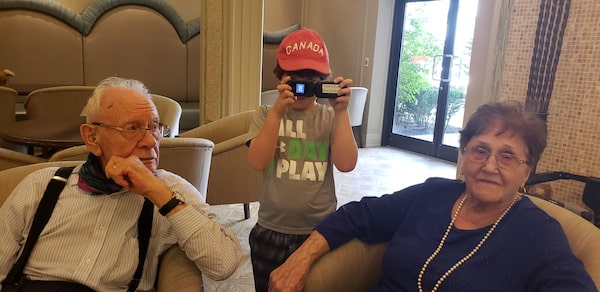
Alessandro and Adelina (with Grandson, Lorenzo) earlier this year, at Richview Manor.Courtesy of Paolo Busato
In March, Alessandro and Adelina Busato enjoyed rich social lives at their retirement home, weekly drives and frequent visits from family.
Now, after a series of medical crises and isolation stemming from the COVID-19 pandemic, the Toronto-area couple’s health has deteriorated so dramatically they need round-the-clock care.
The Busatos’ sharp decline offers a microcosm of how the devastating effects of the pandemic are complicating life for the elderly in the already overburdened health and long-term care systems, making challenging situations nearly unbearable.
Mr. Busato, 92, has experienced cognitive decline and, for a time, lost the will to live. Mrs. Busato, 88, broke six bones in two falls and contracted COVID-19 at a rehabilitation facility. Both may never walk much again.
When Mr. Busato was finally reunited with his wife of 64 years recently, he didn’t recognize her.
“They’re confused about what’s happening to them,” said Catriona Delaney, their daughter-in-law. “I think they felt abandoned, lonely, lost, useless.”
The couple’s ordeal began when Mr. Busato had a bad fall in mid-March just as Ontario’s retirement homes, long-term care facilities and hospitals closed to visitors.
For the next 3½ months, their son, Paolo, and daughter, Emanuela, had to rely on phone and video calls to stay in touch with their parents. But as their health faltered, the couple, who immigrated to Canada from Italy in the 1950s, often struggled to communicate. At the same time, the family dealt with an ever-shifting cast of doctors, nurses and administrators as they tried to understand their parents’ conditions and plan for their future.
Adelina and Alessandro Busato reunited for the first time since mid-March, 2020.Courtesy of Paolo Busato
While many of the Busatos’ ailments are not uncommon among the elderly, even small problems became overwhelming: Mr. Busato was taken to hospital without his hearing aides three times and didn’t grasp what was happening.
“If there hadn’t been a pandemic, Paolo and his sister and all of our collective children would have been living in the hospital with them – in there every day for hours at a time, bringing our own food and bringing music and making sure they had their slippers and their hearing aides and all the things that families do,” Ms. Delaney said. “They didn’t have that.”
Mr. Busato first ended up in hospital in mid-March several days after falling off his motorized scooter at Richview Manor, his retirement home in Vaughan, north of Toronto.
He was initially checked by a nurse at the facility but had agonizing pain when lying down. A few days later, a doctor saw him at the home and said he needed X-rays, but didn’t arrange transportation, said Paolo Busato. The family called an ambulance and he was taken to hospital, where he was diagnosed with a fractured pelvis.
Joseph Gulizia, president and CEO of UniversalCare Canada Inc., which manages Richview Manor, declined comment on the Busatos’ case but said in a statement that the family’s “accusations are inaccurate” and the facility provides “exemplary” care to residents.
Shortly after Mr. Busato was sent to a rehabilitation facility from the hospital, Mrs. Busato fell and fractured her wrist, ribs, shoulder and pelvis but didn’t remember what had happened. She was sent to hospital and then a transitional centre that provides rehabilitation and other services for patients waiting for long-term care or home care. She contracted COVID-19 and, on morphine for pain, was agitated in calls with her family.
“She was just so confused and so desperate, saying ‘Why don’t you come and get me? Why can’t I see you? Where is my husband?’” Ms. Delaney said. “It was heart-breaking.”
In the meantime, Mr. Busato couldn’t return to his retirement home because of a COVID-19 outbreak. He stayed at the rehabilitation centre for an extra month, becoming confused and depressed. The day after he went home, a nurse found him in bed with a fever and lying in his own blood and urine.
After a round of antibiotics in hospital, Mr. Busato was sent back to his retirement home with a catheter he was ill-equipped to manage. The next day, the nurse sent him to hospital again. After almost three weeks there, Mr. Busato was sent to a transitional centre.
The ordeal left him deeply depressed.
“He was just telling us every day, ‘I just want to go to sleep and never wake up again,’” Paolo said.
In the meantime, Mrs. Busato had fallen at the transitional facility and ended up in hospital with a fever. She was eventually diagnosed with sepsis, a fractured pelvis and a broken tailbone. In late June, she was sent back to the centre. Although her husband was also there, they were in quarantine and unable to see each other.
Finally, after 3½ months apart, Mr. and Mrs. Busato and their children were reunited at the transitional centre on July 4. It took Mr. Busato several minutes to recognize his wife and son.
“It broke our hearts,” Paolo said.
Since then, Mr. and Mrs. Busato have been moved to the same room and had several visits with family. Mr. Busato’s spirits have improved, but he has lost about 35 pounds. Mrs. Busato has mostly recovered from COVID-19, but has been left incontinent. The family doubts either will be able to walk much again.
The couple now require a nursing home but because of the COVID-19 pandemic, many are closed to new admissions. It’s unclear when and where they’ll get beds and if they’ll be able to stay together.
“It’s a nightmare for them,” Ms. Delaney said. “We don’t know what their future’s going to be but I’m fairly certain that this is killing them.”
Our Morning Update and Evening Update newsletters are written by Globe editors, giving you a concise summary of the day’s most important headlines. Sign up today.